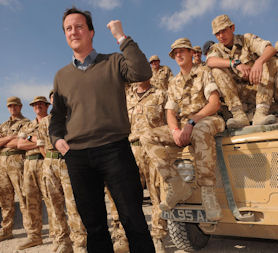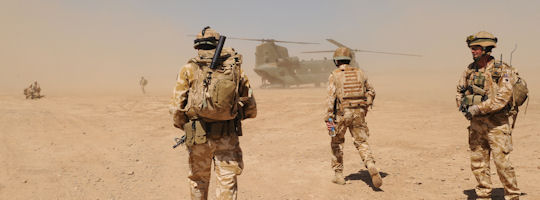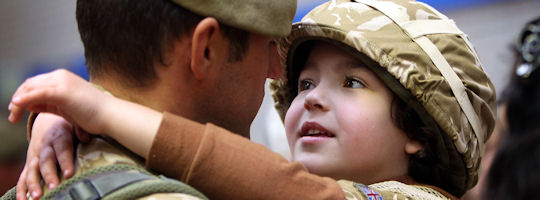Afghan talks: general's 10 point plan for Cameron
Updated on 31 May 2010
Exclusive: As David Cameron gathers experts and ministers for "secret" Afghan talks, former Helmand commander Andrew Mackay and Operation Snakebite author Stephen Grey set out 10 key points for the PM's agenda.

As the new prime minister, David Cameron now has an historic opportunity to engage in a fresh and innovative reassessment of the mission in Afghanistan.
Today he will hold a Chequers summit of his National Security Council about the UK's strategy in Afghanistan.
Foreign Secretary William Hague, Defence Secretary Liam Fox and International Development Secretary Andrew Mitchell visited Afghanistan 10 days ago.
It comes as the United States takes control of about 8,000 British troops in Helmand Province as part of a Nato restructuring. Britain's mission in Afghanistan will change, perhaps radically, in the coming months, Nick Paton Walsh writes.
We believe success in Afghanistan will be dependant on a) a coherent relationship with the US b) an agreed strategy within Nato clearly communicated to the public, c) an agreed approach to address the weakness of government in Afghanistan and d) a root and branch re-examination over the coming months into the contribution made on the diplomatic, military and development fronts by the UK in support of the Afghanistan mission.
UK death toll in Afghanistan rises to 289
Blog: new role for British troops in Afghanistan
Officials, diplomats and generals have often made a habit of telling politicians what they want to hear, rather than the candid truth about why we have failed to make the necessary progress in Afghanistan and why we have betrayed thus far the great sacrifices made by Britain's armed forces.
Ahead of Cameron's Afghanistan "shura" at Chequers, we offer some suggestions in the following 10-point agenda. It is based on our own experiences and conversations with those at the frontline of this conflict, whether inside or outside the military.
If he exercises too much caution in altering course, it will be time to start planning Nato's exit and preparing for the consequences.

(Andrew Mackay when he was commander of UK forces in Afghanistan 2007/08. Photo - Nick Cornish)
1) Leadership and will
Without UK "political will" all is lost; with it everything is possible. It has been an absent commodity for too long and we have been content to muddle through. The country is at war and requires wartime strategic political leadership that unifies the diplomatic, military and development objectives.
2) Sustainable strategy
a) In talks with our allies, the UK should promote a sustainable approach that achieves greatest effect with a lighter, more expert touch allowing us to devote troops/resources/sacrifice equal to Afghanistan's moderate strategic importance. Only such an approach can be sustained for the lengthy period required to achieve success.

(British troops approach a military helicopter at the Pimon military camp, Nad-e Ali - Getty)
b) The US presidential pledge to begin withdrawal from 2011 is flawed, and every effort should be made to link withdrawal with success, rather than some artificial timetable. Those tangible successes of our current military efforts are being undermined by an impossible political imperative.
c) Our current approach of fighting to sustain and prop up a corrupt central government with a very weak mandate is an ugly mirror of the approach of the Soviet Union and will thwart all attempts at a coherent strategy unless fully and meaningfully addressed.
d) While nothing precipitous should be contemplated, of far greater importance than any new military offensive is the development of a credible political approach to bolster support for provincial government within Afghanistan and follow the path of tribal engagement (particularly among the Pashtun), the removal of criminals from power, and the withdrawal of our unconditional support for the unpopular. There is no solution without reconciliation of the Taliban.
e) Bolster the chances of a political settlement by supporting removal of UN sanctions against all senior Taliban leadership; signal willingness to see a Taliban role in future government in Afghanistan; make clear that all Nato troops will withdraw as soon as a stable political settlement has been agreed and bedded in.
f) All of the above indicates why politics are central to this campaign and constant engagement is essential.
3) Encourage free debate
Many of the best ideas for getting us out of this mess are currently being developed by those at the lower ranks of the military yet they are ignored. They have no conduit for expressing better (and more controversial) ideas and are required to submit articles, papers and views on a wide range of subjects for bureaucratic and unnecessary approval.
These are the individuals with the direct experience, who understand the consequences of war and are the least heard, the most patronised, yet have the greatest level of accountability. The National Security Council should have all service chiefs attend when discussing Afghanistan.

(A British soldier gives a pen to an Afghan boy during a patrol in the streets of Showal in Nad-e-Ali district - Getty)
4) Understand the nature of the conflict
We are in an era of behavioural conflict where are seeking to force adversaries, corrupt politicians and an insecure population to make better choices. We will never "kill our way to victory" in Afghanistan.
In this population-centred conflict we need strategies and policies that help people both individually and collectively to make the right choices. The UK ability to conduct "influence" operations among the population is a mess and is incoherent. The population is the prize.
5) Reform the British Army
The army has been slow in updating its ethos or procedures from the Cold War. It needs to dedicate to perpetual adaptation: capable of radically transforming itself to be able to fight and win the counter-insurgency wars we have been fighting for nearly a decade.
Abandon peacetime-based career-centred six-month deployments. It needs to create an institution that can conduct operations across all spectrums, one that is a weapon of engagement with all populations across the globe, not merely a fighter of industrial warfare.
6) Purge the chain of command
The UK will fail to formulate a coherent and forward-looking strategy if it relies on the same organisational rigidity. Senior leaders got us into this mess. Too many individuals have been making the wrong decisions, in the wrong place and at the wrong time. Accountability is absent and comfort zones have been reinforced.
Adaptation is a prerequisite for success yet we have stifling bureaucracy; organisations that are unchanged in their outlook, smug in their authorities and determined to guard against any change.
A cull should be instigated of the senior commanders not fit for their role in the war at hand (and who may have played an unhelpful contribution to the unsuccessful conventional-orientated campaign so far); promotion systems need to be torn up and replaced with those apt for a war; those fit for command should not be kept waiting to assume responsibility.
7) Give more attention, not necessarily more resources
More troops and helicopters, for example, mean nothing when employed by commanders in pursuit of vainglorious but misguided strategy - or spread too thinly to achieve any real effect.
The problems will be stated elegantly by all your advisers. Solutions are far harder to come by; the principle deficiency is a lack of good ideas for solutions and a willingness to see through their implementation.

(Five-year-old Ashton Peterson welcomes home his father Sergeant Carl Peterson, of 2nd Battalion The Yorkshire Regiment - Getty)
8) Establish a stabilisation force
Put together civilian experts – from development workers, to engineers, to anthropologists - and (crucially) select them by excellence to deploy to hostile environments at short notice. They will provide substance to a "comprehensive approach".
They need to be comfortable with the military and be relaxed about military command and not be regulated by "duty of care rules" that restrict their ability to operate alongside soldiers. In other words, to do their job they need to be able to venture outside the front gate of a forward operating base.
9) Equipment
For too long we have operated a deeply flawed policy of relying on Urgent Operational Requirements (UOR) for buying equipment. UOR was intended for the unforeseen, requirements in Afghanistan are now foreseen.
What kind of equipment policy demands that equipment to train on in this country cannot be afforded and is subsequently in short supply? A UOR policy achieves just that. What kind of policy ensures that sustainability of equipment in theatre creates resupply difficulties? Yes, a UOR policy. What kind of policy sends equipment in long after it was needed? UOR.
10) Care of the injured
A nation that sends its men and women into battle has a total commitment to care for them when the consequences of those battles unfold.
A nation that places too much emphasis on charity to do so fails in that commitment. A nation that allows injured personnel and their families to fight alone in receiving appropriate care fails those individuals. A nation that witnesses our prisons and streets being populated by former servicemen fails in that commitment.



